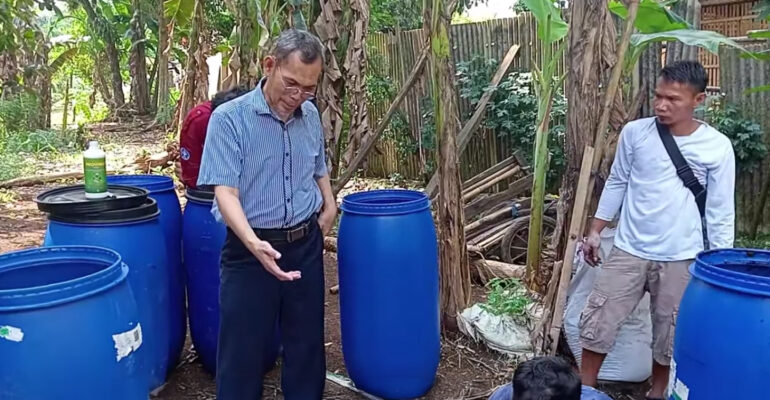IPB University Lecturer Empowers Manglad Village Residents to Turn Cow Manure into Economically Valuable Products

The community service team from IPB University succeeded in empowering the residents of Manglad Village, Cibodas Village, Rumpin District, Bogor Regency through various programs. One of them is through processing cow dung into organic fertilizer with economic value.
The service activities took place from June to December 2024 and focused on improving the economy and quality of life of local residents. The waste processing team involved in Manglad Village consists of IPB University lecturers and students with funding support from the Directorate General of Higher Education, Ministry of Education, Culture, Research and Technology (currently Kemdiktisaintek).
Before starting the waste treatment practice, IPB University lecturer Dr Deden Saprudin said that the IPB University team first provided counseling on the importance of work safety. The team also distributed personal protective equipment such as gloves, shoes, and masks to residents of Manglad Village.
“Work safety is the main focus in this program, especially in the process of making organic fertilizer which has the potential to cause risks,” said Dr Deden.
After that, the IPB University team guided the residents of Manglad Village in making organic fertilizer from cow dung. The method used is decomposition with the help of microbial consortium. This organic fertilizer can later be sold by residents to increase their income.
The lecturer of the Department of Chemistry, Faculty of Mathematics and Natural Sciences (FMIPA) IPB University explained that making organic fertilizer from cow dung requires several materials, including 250 ml provibio for one large barrel, water for half a large barrel, 20 kg of cow dung, dolomite to raise pH, and husks.
In addition to organic fertilizer, the IPB University team also taught the residents of Manglad Village how to make biogas from cow dung. This biogas can be used for cooking, and can even help the drying process of organic fertilizer during the rainy season.
“To speed up the organic fertilizer production process, the IPB University team also introduced sieving technology. With the sieving machine, organic fertilizer can be finer and ready to use, and has a uniform quality. The organic fertilizer production process becomes faster, so productivity increases,” he said.
With the various programs that have been carried out, Dr Deden hopes that the residents of Manglad Village will become more independent and have additional income. “Hopefully this activity can continue and be developed further so that the welfare of the residents of Manglad Village will increase,” he said. (MHT/Rz) (IAAS/Hap)



















